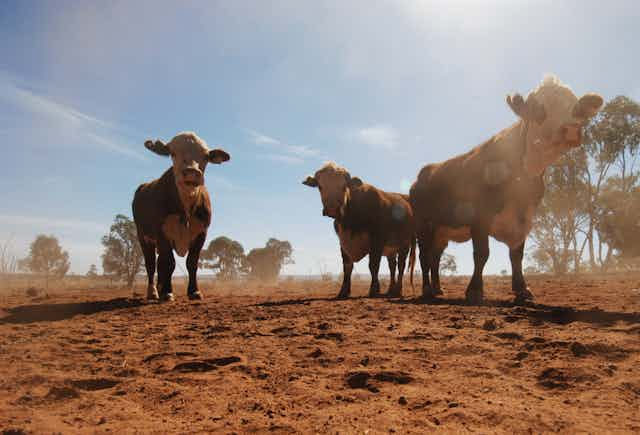Due to a serious drought that has seen one-third of Queensland drought declared, farmers are struggling to feed their cattle. There’s inadequate feed on their own land, feed is hard to source in the marketplace and temporary grazing sites are also proving hard to find.
A possible solution supported by Northern Queensland graziers, the Queensland branch of the RSPCA, MP Bob Katter and the Federal Opposition, is to allow 25,000 cattle to graze in Queensland national parks. So far Federal Environment Minister Tony Burke has rejected that proposal and instead wants feed shipped into northern Queensland, and for the cost to be subsidised by the Queensland Government.
In this instance two groups who are typically at loggerheads have suddenly discovered their interests intersect. Animal protection advocates, whose focus is the wellbeing of the animals, and farmers whose bottom line depends on meeting the needs of the livestock, both want the cattle fed quickly. Neither group sees a problem in opening up national parks to hungry animals.
Where there is opposition to this plan, it will come from the environmental lobby. In the past, environmentalists have campaigned against grazing in national parks. Last year Tony Burke intervened to ban cattle grazing in Victoria’s Alpine National Park. But in that case Victorian cattle were not at risk of starvation so there was no clash between animal protection and environmental values. In Queensland the situation is more complex and alliances have shifted.
For most animal advocates, safeguarding the interests of a piece of land is not the priority. Flora, unlike fauna, does not suffer. Trees are not sentient beings and therefore do not have the same moral status as animals.
Whether human or nonhuman, animals are morally significant because they are capable of experiencing pain. This is true whether you think animals have rights and therefore should not be exploited, or whether you just think animals ought to be treated humanely on their way to the slaughterhouse.
Moreover, because we have brought these cattle into the world, many animal advocates argue that we have a duty to protect them against harm – a duty that does not necessarily apply to wildlife.
The holistic approach favoured by environmentalists, on the other hand, values the integrity of the whole ecosystem. Environmentalists do not recognise unique value in the sentient creatures who live in the world or even those with cognitive ability like human beings. For environmentalists, individual wellbeing is meaningful when considered as part of a flourishing environment.
In this case attempts to resolve conflicting value systems with complex moral theory provide little practical guidance. The question is: what do you value most – the individual who can suffer or the ecosystem upon which varied forms of life depend?
While most people don’t want cattle grazing in national parks, they certainly don’t want to learn of cattle starving to death in barren paddocks.
Maybe the ideal solution would be to deal with this emergency as best we can now by permitting cattle to graze in the parks in the short-term, but then to have a long think (and conversation) about whether a continent that regularly experiences serious drought is a good place to raise hard hoofed and water hungry animals at all.

